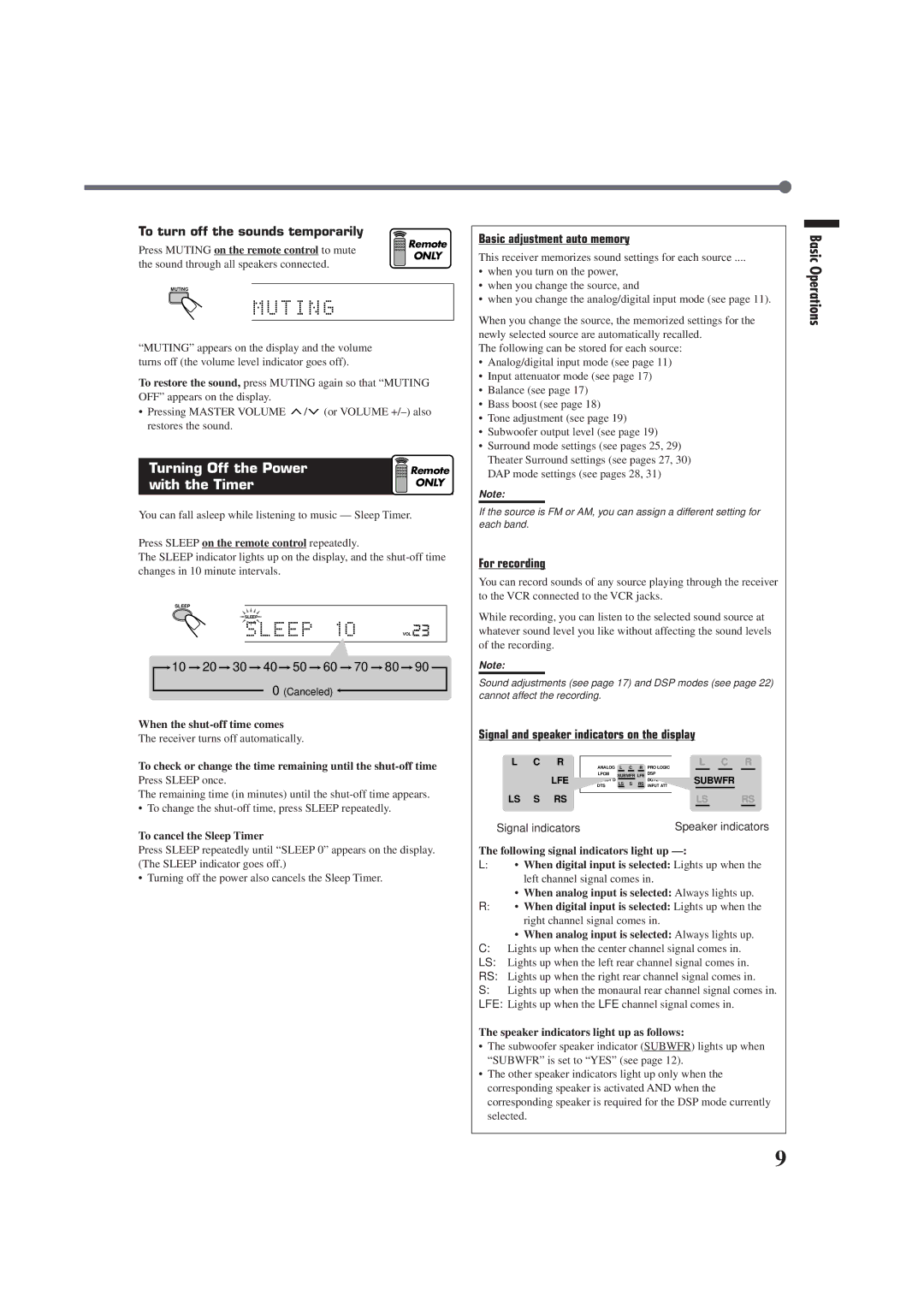
To turn off the sounds temporarily
![]()
![]()
![]() Remote
Remote
Press MUTING on the remote control to mute ![]()
![]()
![]() ONLY the sound through all speakers connected.
ONLY the sound through all speakers connected.
MUTING
TO
“MUTING” appears on the display and the volume turns off (the volume level indicator goes off).
To restore the sound, press MUTING again so that “MUTING OFF” appears on the display.
•Pressing MASTER VOLUME ![]() /
/![]() (or VOLUME
(or VOLUME
Turning Off the Power | Remote |
with the Timer | ONLY |
You can fall asleep while listening to music — Sleep Timer.
Press SLEEP on the remote control repeatedly.
The SLEEP indicator lights up on the display, and the
SLEEP
L | R | SLEEP |
LPCM
DGTL AUTO
VOL |
 10
10  20
20  30
30  40
40  50
50  60
60  70
70  80
80  90
90
0(Canceled) ![]()
When the
The receiver turns off automatically.
To check or change the time remaining until the
Press SLEEP once.
The remaining time (in minutes) until the
• To change the
To cancel the Sleep Timer
Press SLEEP repeatedly until “SLEEP 0” appears on the display. (The SLEEP indicator goes off.)
• Turning off the power also cancels the Sleep Timer.
Basic adjustment auto memory
This receiver memorizes sound settings for each source ....
•when you turn on the power,
•when you change the source, and
•when you change the analog/digital input mode (see page 11).
When you change the source, the memorized settings for the newly selected source are automatically recalled.
The following can be stored for each source:
•Analog/digital input mode (see page 11)
•Input attenuator mode (see page 17)
•Balance (see page 17)
•Bass boost (see page 18)
•Tone adjustment (see page 19)
•Subwoofer output level (see page 19)
•Surround mode settings (see pages 25, 29) Theater Surround settings (see pages 27, 30) DAP mode settings (see pages 28, 31)
Note:
If the source is FM or AM, you can assign a different setting for each band.
For recording
You can record sounds of any source playing through the receiver to the VCR connected to the VCR jacks.
While recording, you can listen to the selected sound source at whatever sound level you like without affecting the sound levels of the recording.
Note:
Sound adjustments (see page 17) and DSP modes (see page 22)
cannot affect the recording.
Signal and speaker indicators on the display
L | C | R | ANALOG | L |
| C |
| R | PRO LOGIC | SLEEP | L C | R | ||||||
|
|
| LPCM |
|
|
|
|
|
| DSP |
|
|
|
|
|
|
|
|
|
| LFE | SUBWFR LFE | SUBWFR |
|
| ||||||||||||
|
| DOLBY D | LS |
| S |
| RS | DGTL AUTO |
|
| ||||||||
|
|
| DTS |
|
|
|
|
|
| INPUT ATT |
|
|
|
|
|
|
|
|
|
|
|
|
|
|
|
|
|
|
|
|
|
|
|
|
|
|
|
LS | S | RS |
|
|
|
|
|
|
|
|
|
|
|
|
|
|
|
|
|
|
|
|
|
|
|
|
| LS |
| RS |
| ||||||
Signal indicators |
|
|
|
|
|
|
|
| Speaker indicators | |||||||||
The following signal indicators light up
L: • When digital input is selected: Lights up when the
left channel signal comes in.
•When analog input is selected: Always lights up.
R:• When digital input is selected: Lights up when the right channel signal comes in.
•When analog input is selected: Always lights up.
C:Lights up when the center channel signal comes in. LS: Lights up when the left rear channel signal comes in. RS: Lights up when the right rear channel signal comes in.
S:Lights up when the monaural rear channel signal comes in. LFE: Lights up when the LFE channel signal comes in.
The speaker indicators light up as follows:
•The subwoofer speaker indicator (SUBWFR) lights up when “SUBWFR” is set to “YES” (see page 12).
•The other speaker indicators light up only when the corresponding speaker is activated AND when the corresponding speaker is required for the DSP mode currently selected.
Basic Operations
9
